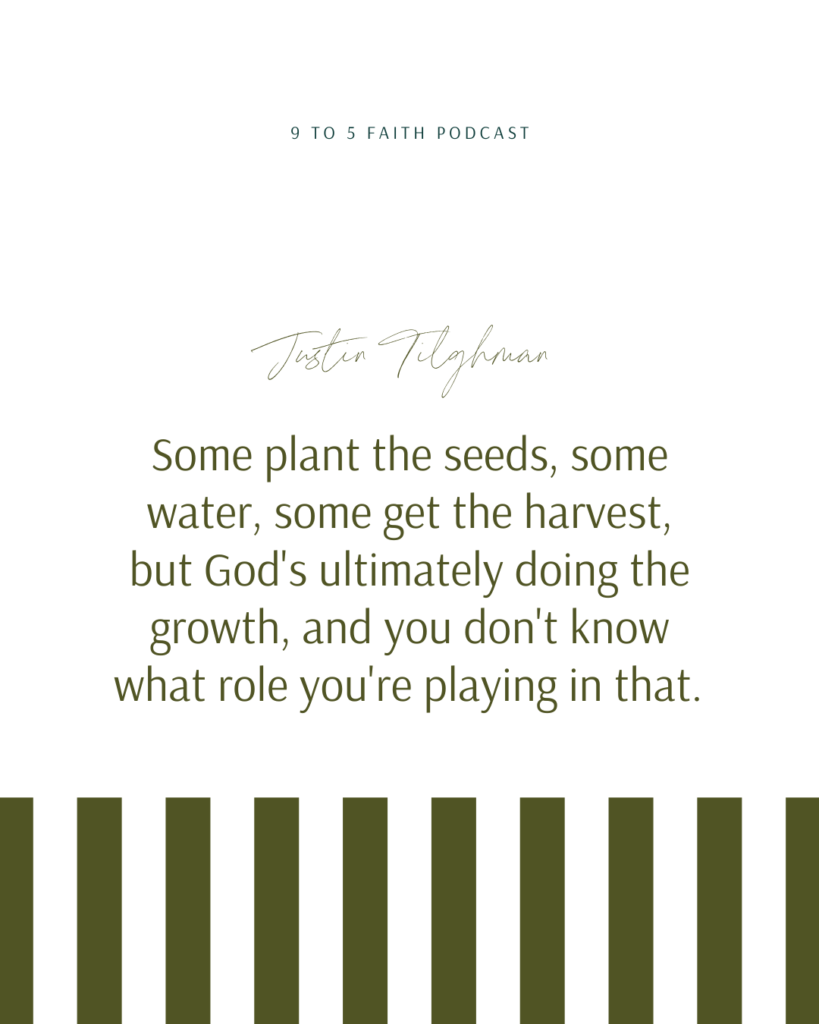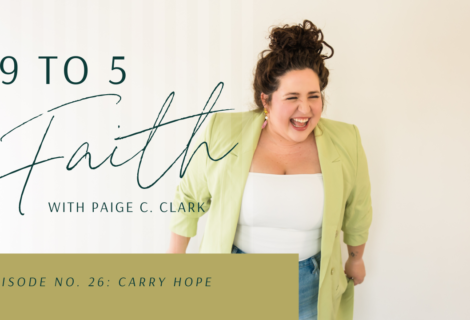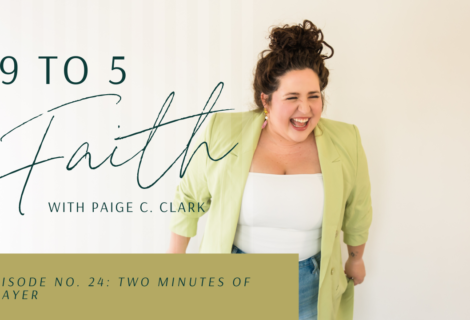This is a transcript from episode 17 of the 9 to 5 Faith Podcast with Paige C. Clark.
Share on Social




Start of Podcast
Paige C. Clark 00:35
Hello, everyone, welcome to another episode of nine to five faith. I am so excited to be introducing one of my friends Justin Tilghman. Justin, how the heck are ya?
Justin Tilghman 00:46
I’m doing pretty darn good. Thank you for asking.
Paige C. Clark 00:48
You’re welcome. So tell our audience a little bit about yourself. What do you do? What’s up? What keeps you busy in the nine to five space and, and beyond?
Justin Tilghman 01:01
Yeah, so I’m busy. I’m real busy. So my daytime job is I work in higher education. So I’m a dean at a college and oversee a pretty large program. It’s a student from all over the country. So we stay busy, one of the largest programs in our state, and we’re the largest in the country for what we do. So we stay real busy. Got two young boys, beautiful wife, they keep me busy, a three year old and a four month old. So I got one that’s run all over the house. And one, it’s a potted plant. So that’s, that’s given me plenty to do. I’m fully in the superhero world right now. And also, I’m very involved with our church, I’m an elder at our church Grace fellowship. And so stay busy with that we lead a small group Bible study, my wife and I, and, and then also do life and leadership coaching. So got lots of pots and lots of different fires.
Paige C. Clark 01:55
I love that. I love that. And I also like asking that question, because I know everyone doesn’t do just one thing, or at least the people I’m talking to y’all are, you know, people have many talents and many different skills. And so talk to us a little bit about, like, what a day in the life of Justin looks like and how you learn to kind of balance just all all of the things, especially having kids and what that looks like and leading a small group and being in charge and doing all the business things and all the work things.
Justin Tilghman 02:31
Yeah. So typical day, I like to start at five o’clock, that’s not happened here. Lately, my life, my wife has been laughing at me waking me up, she’s like, you know, it’s not five, I was like, I know, I know. But because I like to do the business stuff in the morning for me my coaching business as far as the essentials in the morning, because that way doesn’t need in the family time when I get off work. Occasionally it has to, it’s just the way things are. But then it’s my wife and I split the duties of getting the kids off where they need to go. My wife’s an elementary school teacher, so we kind of have to one kid goes one way to preschool and one one goes to our neighbors down the road who helped us watch him. So managing that and then ended up the office, managing the higher ed stuff. And I usually take my lunch breaks, and maybe I’ll coach a client on my lunch break. Try not let that I obviously don’t want that interfere with a full time job and then do do some coaching at night. I try to keep that really limited. Just because that’s I try to like set balance keep up for the kiddos and a wife and and then at night it’s either small group Bible study, occasionally there’s an elders meeting at church. I work with a Christian school here, I’m on their board, so occasionally have a board meeting. But really try to keep those nights for playing superheroes playing Hulk and Captain America and, and, and just loving all my family cuz I don’t want them to get the leftovers. And so prioritize that nighttime is for them. So,
Paige C. Clark 04:05
yeah, yeah, that’s awesome. And, and how has that routine kind of transitioned over the years if it has at all of like, you know, kind of refining the different kind of rhythm and routine that you have?
Justin Tilghman 04:21
Yeah, that’s great. So it has changed and it’s, I think it’s in flux. It’s different now with two kids and it was with one kid than it was with no kids. And so like, with no kids, my wife and I, you know, we could still, I could do a lot more in the evenings. Because we had space to you know, we could just be in the living room together and working on things and and I was also doing doctoral work at that time. So that gave lots of space to do all that stuff. One kid came along, obviously change that, as he got older, more self sufficient. Could be a little bit more at night, that we my wife and I can still connect because he was gone to bed, and now with two kids, that’s totally different. Which is why I was like, Well, I gotta put some more time on the front end of the day. Because have been two kids at night having to get one in the bath and feed one a bottle. And it’s just gotten to a point where, you know, if we’re gonna get quality time as a family, it has to be very little done outside of family in the evenings. Yeah. And so it’s just been the biggest thing is communicating Shinnok communicating of hey, what do you need? This? These are the things I need to do, how can we make that work? How can we work together? For that we’re both getting what we need, the kids are getting what they need. And everybody as much as we can, is getting what they need to flourish, and the boys are getting what they need from mom and dad. So it’s a it’s a dancer. Yeah, cause and that’s why I like I like balance that I do balance because people think balance is like this, but it’s really Alright, step in here.
Paige C. Clark 05:51
Yeah, a little bit of each way. And I mean, I am a huge proponent of like waking up early. I’m like, ultra productive when I wake up early. But my issue is, is I’ll wake up early, get what I need to get done. And then I’ll fall back asleep until I have to start work. Am I back at? Like, all the time, I’ll get up at four. And then I’ll like be like, yeah, like going to the gym in the morning, go off. And then I get home. And I’m like, zombie and I’m, like completely unhelpful until like nine o’clock rolls around.
Justin Tilghman 06:26
Yeah, well, I’ll get up at five. And I’ll crank out, you know, podcast episode for the coaching business or something like that. And then the next thing I know, my little boys wrap it on my office door, Dad, are you awake? Fell asleep.
Paige C. Clark 06:38
I mean, that’s real life, though. So working in higher education? What does kind of like the integration of your faith look like? And kind of how you carry yourself how you do your job? And then also like, what struggles do you encounter because I also worked in higher education, but I also worked at a Christian college. So that is a little bit different than you know, and also your wife is in education as well. So I’m sure you know, we see a lot of the conversation where just faith has been removed from the workplace, but also from education. And those spheres, we’ve seen kind of a slow transition, and then now it feels like warp speed. So tell us a little bit more about that.
Justin Tilghman 07:24
Yeah, so I have always been one that my faith is part of who I am, I try really hard not to have a sacred secular sacred divide in my life. And I’ve always been upfront with the people I work with the students I teach. And I mean, I’ve had staff members, faculty members come in my office, because it straight up say, I know, you’re somebody who prays I’m going through this, would you would you pray with me, and I’m always going to say, if you ask for it, absolutely. You do have to be careful from working for a state college and my wife working state education, you do have to be a little careful of initiating that. But I have found that people are more receptive to that than the news would make you think. Right. And, and especially when they work with you, and they know the kind of person that you’re and if you leave with if you if you work with integrity, so if you are, if you say I’m a believer, and you can make that known, and it’s how you also work that way, and they can see that in the way that you operate. They know that it’s coming from a place of genuine care, it’s not coming from a place of I’m trying to put something in your face. Because I’ve had, I’ve had colleagues that we very much disagree on a lot of things, but they know where I’m coming from. And so when I do share something with them, they know it’s coming out of a place of I this is who Justin genuinely is and he genuinely cares. And that’s why and the door is open for them in the other way. Like it’s not just I’m Justin, I’m a Christian here, take my faith and do something. But it’s also Hey, I wanna have a genuine conversation with if you disagree, it makes me stronger, knowing why you disagree. Right and and creating that space for those conversations. My wife and I will both have both talked about it. And again, the national narrative is what it is. But I have found boots on the ground, it’s different. There’s still those landmines, you have to dance around. I mean, they’re there. But it’s not quite like. And I’m not saying that’s not that’s an overgeneralization for a lot of people, but for where I am I and where she is, in terms of the jobs that we have. It’s not that way. Yeah, we do have to be careful. We do have to do a little bit of a dance with some things. And there’s some things that can’t initiate. But students certainly can. But I do what I can to make it known to students and colleagues if you want to negotiate those things outside of nice having a big fat banner. Right, you know, you can well pray. Yeah, yeah.
Paige C. Clark 09:55
Yeah, for sure. And I think too, like, especially over the past few years. Here’s my husband, he’s been like, he was like a news junkie, meaning like, he was always consuming the news. And it just got to the point we actually like, gave it up one year for Lent. And then we realized how much happier we are. And I’m like, you know, if you just like, keep your head down in your community, and like, only involve yourself in stuff you’re involved in, involve yourself in your community and the people around you, your neighbors and your family, you’ll realize the world is a much nicer place than then yeah, you’re being told it is.
Justin Tilghman 10:35
I completely agree. And my wife and I have talked about that, in that I feel like with with social media and the 24 hour news cycle, it’s almost like we’re being forced to be omniscient when God never created us to be omniscient. And, and we’re not. It’s a one hand, we think it’s great to be able to know everything going on when it’s happening. But look at the anxiety that’s caused in people and you’re 100%, right, that I have learned in those moments where I focused on where I am, where God placed me in the community, that people he’s placed me with things calm down a lot better, a lot more, because those people know you. Right? And so they know where you’re coming from. For the most part, I mean, again, it doesn’t fit every problem. But you’d like you said the world’s when you take that more circular view of where you are, the world looks different than when if you just stay on the news and social media.
Paige C. Clark 11:26
Yeah, yeah, I actually had this conversation with my mother in law just last night. Because she’s getting older, she’s having a harder time kind of like, navigating just like her brain, and you know, all those things that come with aging. And she’s like, I think I just need to give up the news. I was like, you definitely should like, turn off the news. Because she’s retired and home all the time. She watches the news all the time. And she’s like, Yeah, how do you find out what’s happening in the world? And I go, if it’s affecting the people around me, I’m going to find out about it. If it’s not affecting the people around me or myself, or like, my family, or my neighbors in my community, then it’s it’s not really my concern. It’s not, you know, not my, you know, battle to fight in that regard. So yeah, I totally, totally agree with that. Yeah.
Justin Tilghman 12:15
And I think, you know, there are people that God has called her and equipped to, to pay attention to that. And they’ve been called and equipped and gifted to do that, not everybody has. And so I think the people that have that gifting and have that calling, can handle it. Not all of us can. And so we shouldn’t be trying to step into something we’ve not necessarily been called or gifted to do.
Paige C. Clark 12:34
Yeah. And you mentioned a few times of just having kind of this integrity, and then also having the same of like being known. And I think too, like, as Christians, generally speaking, like, we’re really afraid to be known. Because it shows our weaknesses, it shows our flaws, it shows our mistake. But also, when we’re known, and we are able to act out of integrity, I feel like that’s where Grace shows up. And I think that, that’s really cool to be hearing that, you know, you get to do your job with integrity, but also just like, being who you are. And just like stepping into that is the gateway for people to come to you when they need help and support or prayer or whatever it is in that regard. Oh, absolutely.
Justin Tilghman 13:29
And my wife, she preaches vulnerability and transparency and authenticity all the time. And, and she’s so right. And I found that true here in my life, that Christians already have this stigma of having everything together. And so people outside feel like, well, I can’t step into that church, or I can’t do this, or I, you know, until I’ve got my junk together. And I think when we are when we are open about the things that we’re wrestling with, and the struggles that we have, and they see, I mean, even my my colleagues, they see Justin, unfortunately, overreact sometimes, and Justin can get angry, right? But Justin is quick to us to note that and to go back and ask forgiveness. So Justin’s a real person who, who gets mad, and gets frustrated and can say things he regrets a lot. But he’s also quick to ask forgiveness from people and quit to admit that and own up to it. And, and so it builds, it builds goodwill with people and they see, you know, he’s a believer, but he’s a real person. And so then, you know, I’m not perfect so they can see, I’m not perfect, so, Justin’s not perfect. So, but he’s following Jesus, so there must be something to this Jesus thing. We don’t have to be perfect.
Paige C. Clark 14:43
Right? Yeah. 100% And I think to just like, I always think of it in the back of my mind because I’m, I’m a marketing person. And so, in the back of my mind, I’m just like, gosh, Christians need a PR campaign. Like Christians need a little bit of PR help to like I actually get like the majority of people like what we actually do and what how we actually act because again, you know, if you look big and you look at kind of the more fringe the outside of people who say that they believe in Jesus where that they follow Christ, you’re gonna be like, oh, I want nothing to do with them. But if you just like, look within your community, you’re gonna be like, Oh, my neighbor goes to church, and she’s a good person to be working with, or I can go to them if I need anything, or, or what have you.
Justin Tilghman 15:35
Oh, yeah, because you’ve got, unfortunately, the people that get the most attention, are either the people who are holding up this holier than thou attitude, or the people who said they follow Jesus, but their life looks nothing, no different whatsoever from the rest of the world. And so when they look there, they’re like, you’re not any different from Easter. Why do I need what you have? Right? Are they look at the holier than thou and go? Well? Well, I don’t want to be like you. Yeah. You know, I don’t see that grace, you preach. And I think for those of us that try to live in the middle, or are living in the middle, we don’t get as much airtime.
Paige C. Clark 16:11
Yes, that and that. Hence why I say PR campaign. Anyone? I feel like this is a complete side note, but I feel like things like the chosen. I know like some people are like, super like touchy about and whatever. I’m not going into that. But I feel like there’s things like that that are helping progress kind of this this attitude of approachability in terms of not conforming to culture, but meeting culture and showing up in the way in the places that culture is that
Justin Tilghman 16:43
what I mean, Jesus was human or human he was it was about humanity. And and I think so many times we try to we focus on his divinity, which is great. But we forget he was a human being. And, and and you don’t people, especially children aren’t drawn to humans who are stiff and stuck up and hoity toity. Right. So we don’t know exactly what he was like. But we would get some clues. Because if the kids were running into him, they don’t run. I know my two kids, they don’t run the people who are scary, and hard and mean, say?
Paige C. Clark 17:15
Yeah, and I think that’s been like a really cool thing to see. Kind of just the the intersection of those two things kind of happening. Yeah. So let’s talk a little bit about like your church involvement and what that looks like, within your community. And you said you like you’re on the elder board and, you know, small group or home group or Bible, so whatever you want to call it, you know, you’re you’re doing that. So how do you kind of navigate that in terms of, like, I’ll give my personal experience. I’m just exhausted from the week. Like, I’ll just get to like, home group time. And I’m like, Okay, I’m, like, so tired. Like I could, like, let alone hosting it. Honestly, that’s like, one of the reasons why I’m not like a Bible study host at my church is because I’m like, I do not trust my energy levels. So talk a little bit about that.
Justin Tilghman 18:06
Yeah, I mean, it’s your right. And we to thankfully, the elder meetings are once a month, and and our senior pastor who’s one of the elders on the board, is excellent at running a good meeting. And so I never, I never feel like this was a waste of time or anything accomplished, like it is, he is a he’s a gifted administrator. And so that’s helpful. And with the small group stuff, my wife and I talk about it. So one of our core values at our churches is House tours, or small group Bible studies, and, and we leave for all of our new members, she and I lead that portion of the new members class, okay, and we tell them most weeks, if I’m being honest, we get to Wednesday night, and we don’t want to go. It’s like, we can think of 1000 other things to do. But it’s a discipline and, and we have found what’s helpful is, we we have never left a Wednesday night, house church and gone, that was a waste of time, we shouldn’t have gone, it is really a refreshing thing. And, and so I think in those moments where we feel overwhelmed, it’s one of those things where we know Hey, this is a commitment. This is a discipline and we know it’s for our good. And so it feels like it’s gonna be a drain. But God has put this in our life and he’s put our church community our life to be the refreshment and, and, and really kind of like family, family gets the first should get the first fruits of what you got. In my mind, that’s the priority list of my family, my church family, because I’m knitted closer to them than than anybody and then the rest of everything else. And so trying to keep keep that priority list of that balance is helpful. It’s not perfect. That’s always a work in progress. And there’s like I said, there’s So Wednesday nights around, like, I just don’t know if I got the bandwidth for it, but I go, and I ever regretted it. Yeah. So I think that’s, that’s the thing is, is, for me at least, is knowing it’s important. And it’s, I mean, I’m not, I’m not patting myself on the back, but it’s a maturity thing. It’s making decisions that you know, are for your good even when you don’t want to do them necessarily.
Paige C. Clark 20:21
Right. Yeah, for sure. And I think to like, I mean, I just think of like, two examples came into my mind of like, okay, like going to the gym, right? But then I’m like, Okay, some days, I’m like, regretting going to the gym, like, so that’s probably not the best. The best example but like, on the other side, like, just going to like more. So like, weekend church, for me is is where I require that discipline. And I do just tell myself the same thing of like, you never go and have a bad time. Not that I’m like, looking for like a good time. But like I you know, you always walk away and you’re like, oh, wow, like that was like actually good and actually helpful. And like, I think to like, even if you don’t get anything out of it, I know. That’s like a weird way to say like going to church. But even if, like you still walk away in like a rotten mood, like it’s still exercising that muscle of discipline, like you were saying. And I see Yeah, yeah. And I think too, like, it goes hand in hand with like, the authenticity piece because I’m like, when, when my small group was meeting, I’m like, if I feel like we’re in pajamas, like I’m gonna wear pajamas, because me wearing pajamas. And being with this group of people is better than me being in pajamas at home by myself, like that, because that is what the Lord has called me to do.
Justin Tilghman 21:46
Hey, yeah, I’d agree at it. I like the idea of the muscle, like, it’s one guy in our small group. One was that he made a great point, he said, um, you know, sometimes, you just have to let the emotions take a backseat, and do what you know, is needed. And what you’re doing, like you just said, you’re working at muscles. So you’re storing up, storing up treasure, if you want to call it but you’re storing up. It’s paying to your account. And so it’s some days you feel it. Some days you don’t but you know, you need to do it. And so, like you said, it’s in that way, there’s like a gym like no pain, no gain.
Paige C. Clark 22:28
Right? Yeah. And I think too, there’s, there’s this element. I went, I can’t remember what it was. There were I went to church, and there was a sermon or something. And I was like, listening to it. Oh, yeah. Yeah, there was like this, like, big, like worship thing. It wasn’t associated with the church or anything. But it was like really just to, to draw in kind of new believers. And like, you know, that was the message, not that it was antithetical, or heretical in any ways. But I was sitting there, and I was like, you know, like, not like really getting anything out of this. Like, it’s not like, but then I was sitting there. And I was, like, debriefing this with my husband afterwards. And I was like, You know what? That message wasn’t for me tonight, like, not that it wasn’t like my taste or anything. It just like, what that pastor was speaking on stage. Those words weren’t meant to be spoken to me. They were meant to be spoken to someone else in the in the crowd. Yeah. So you know, just having that mindset of like, they’re preaching Jesus. And I felt and I’m like, Yes, like, Yes, I agree. I agree. But I already got Jesus like we could. And, and yeah, I’m like, this is this is, these words are meant for someone here. And it’s not me, but I’m still here participating as the body of Christ. And that is what we’re called to do.
Justin Tilghman 23:54
Yeah, that’s a great way of putting it.
Paige C. Clark 23:56
Yeah. And sometimes it’s hard. And I think that’s where the authenticity comes in. You have to show up in your pajamas show up in your pajamas.
Justin Tilghman 24:05
You’re right. It’s it’s a your, your real people and Jesus calls real people and you’re not doing anybody any favors putting, putting on a facade. So
Paige C. Clark 24:13
yeah, yeah. And I think too, like, being that person, to your community, allows other people in your community to be that person to you. That’s like one thing. I’m really big at, like my house and stuff. Or I’m like, if I if I were to walk into your house, I want to be comfortable. I want to be able to take off my shoes and maybe curl up on the couch and like, like, that’s just me. I don’t want to be I remember, I remember growing up in there. It’d be like these houses that were like museums, and they were so unapproachable and like you didn’t want to touch anything because like it was white couch and you didn’t want to get fingerprints. And I’m like, I don’t want that to be my house. I was in. So like, when people come over to my house, I’m like, help yourself to whatever you want cabinets, there’s the water, there’s the food, there’s the drinks, go get whatever you need, help yourself, don’t even ask. Just go and get it. Because if I’m invited into a home, that’s kind of how I would want to be treated, and having that vulnerability and ability of like, if I have to wear pajamas one day to small group, because that’s just where you’re giving permission to other people to be their authentic selves, is what I’m trying to say no, yeah,
Justin Tilghman 25:33
that’s right. No, you’re right. And I think, I mean, authenticity breeds authenticity. And so when one person does it, it does give other people the space to breathe and go, Okay, I can be me. And that’s where that’s where real connection and real change happens when people start doing that?
Paige C. Clark 25:50
Yeah. Yeah, that’s true. Because I think too, like, if we have just this facade kind of going into everything, then yeah, it’s authenticity breeze on 100%. Because if people people have like a really good BS radar, and if you’re not being real with them, like they can tell that you’re just like putting on face. And I think that, you know, when we’re able to see past the masks were able to really come together and like, actually grow and actually, you know, foster growth. And there’s another word that I’m trying to think of that just like kind of escape from my brain. But yeah,
Justin Tilghman 26:34
well, that kind of goes back to what we were talking about earlier of the look, your local community looking different than what the news tells you. Because you’re looking at the mask that everybody’s supposed to be wearing. We’re regardless of political side drum, this is the mask you’re supposed to wear. When you get into community with people, regardless of where they are on a political spectrum as a social stretch, or whatever, yeah, start talking to people, you realize we’re a lot more human than then they’re trying to make us think we are. And so we can actually have a conversation. And we can, we can be from totally opposite sides of whatever the issue is, and realize we can still talk to each other.
Paige C. Clark 27:15
Right? Right. And I think too, it’s like, this is off topic a little bit, but like looking at intentions, like that’s one thing that I really try to look at, when, when I’m talking to someone and even in my relationship with my husband, I’m, I think, like, if he does something to upset me, I say, okay, is he purposefully doing that to upset me? Probably not. Like, probably not. So can I be mad at him for upsetting me? Know, Bo, then there’s like, the communication and their growth, opportunity and everything like that. And I think too, like when we look at just whatever issues you want to pull, I’m like, okay, like, we all kind of want to get to the same end result. But how we get there is very different. We’re arguing about the path there. We’re not arguing about the journey. Because if we’re arguing about or sorry, yeah, not, we’re not arguing about the destination. Because ultimately, we all want to love on each other. We all want to be supportive. from a Christian perspective, we all want people to be following Christ and, you know, be able to spend eternity with Him. But the path there is, is where the disagreements kind of come in. And I think that’s what everyone just attacks the path.
Justin Tilghman 28:35
Yeah, that’s a good way of putting I hadn’t thought about it that way.
Paige C. Clark 28:37
Yeah. And and when you look at things through that lens, it just like softens your heart a little bit, in my opinion.
Justin Tilghman 28:46
Or reminds me of the verse that you were, Paul says, You’re our battle is not against flesh and blood. And so the person sitting in front of you is not your enemy. So when you remember that, like you just said, It softens your heart a little bit, and you realize this is another person. Yeah. And they’ve got hopes, dreams, feelings, right? And so being mindful of that is helpful.
Paige C. Clark 29:06
Yeah. So let’s talk about like that. And like, the students that you work with, and like, Do you have any like examples of just really seeing God’s hand and his provisioning over what you do every day?
Justin Tilghman 29:25
Yeah, um, so I teach mainly, I teach online mostly. And so what I have found, I’ve had students that I knew from the community I’ve also had students who were not from my community. I’ve had students that were believers and we’re openly sharing that I have students who were not and have openly shared that and for me in the classroom, like really trying to model for them what what I do with My colleagues like, hey, we can, because to me, that’s one of the things that we’ve lost the ability to do is to interact with who would don’t agree with. And so modeling that for them, showing that what that showed them, what that looks like to respectfully disagree and to share your thoughts, opens up a lot of doors. And I just think God has been God’s been gracious in my classrooms, to, for whatever reason, make them spaces where folks have felt safe to share things that that have been tough. I’ve gotten emails from students saying, Hey, I know it was out last week. This is why and I’m like, man, thank you for trusting me enough to share that with me and not just saying, I’m gonna be out. And so I’m trying really to see that as, again, talking about the secular sacred divide this, this calling to teach. I mean, I don’t, I do teach. I teach at a couple of different places outside of my full time job, I’ve got some adjunct jobs. But so I teach at a Bible college where I do get to teach theology, and the students are typically right there with me. But my daily job teaching is not at a Bible college. And it’s not in a in a theological background or anything like that. And so seeing both of those as a calling from the Lord and a trust from the Lord, in that the students he’s given me Why yes, they’re mostly adults. They, their his, his, there’s creation, they’re in his age. And so I might get to be hate uses cliche, but I might get to be the only Christian that they interact with. And the only Bible they read is what love people say. And so yeah, really trying to be mindful of that. And and how can I exhibit a Christ like heart here? And come across in a way that’s firm in the sense that I’ve got rules we have to follow we have. We have a syllabus, we have to follow it. But we’re in that can I show grace, even if it doesn’t look like Christian grace? But where can I show some grace, it’s the hey, look, life happens. I know, the syllabus says this, but I’m going to exercise some grace here. And it’s not related to big Jesus follower anything other than it comes from that, that heart of grace, but that even that has opened up doors like man, nobody’s ever done that for me before. I really appreciate that. And that opens up an opportunity to share Well, this is why I do that.
Paige C. Clark 32:27
Yeah. Yeah, for sure. And I think too, when, when, when you’re talking with with students, especially, like, generalizing, I know, there’s like a lot of adult learners, but just, they’re in this like, super formative part of their life, like entering into college. And I think too, like, yes, you might be the only person who shows them Jesus. But also, you may be planting seeds that you don’t even know that you’re planting. And I think that’s like, I don’t know, an encouragement I want to give to anyone who’s listening have like, if you feel like you’re not seeking or like reaping the harvest, like, you may be planting something that is yours, you know, in the making. And and that is your opportunity to kind of speak Jesus. And in that place, even though it might not, I guess, like convert in a really quickly I know that’s like such, I’m not saying like converted, like, a Christian sense. I’m saying, like, convert in a marketing sense, because that’s how we talk, but also it kind of worked.
Justin Tilghman 33:39
Yeah, no, I think you’re exactly right. It’s it’s, you don’t know, do you use your journey metaphor from earlier, you don’t know where that person is on their journey and what part you’re playing? And I think so many times, I just think that evangelism, especially in the workplace, because I’ve wrestled with this. If I’m not blatantly sharing Jesus, in every conversation, I’m not doing what I’m called to do. And that’s not true. You know, Scripture plainly says, you know, some some plant the seeds, some water, some get the harvest, but God’s ultimately doing the growth and, and you don’t know what role you’re playing in that right. And he might not be calling you to do to seal the deal thing in the end. Yeah, he might be calling you to plant plant the first seed of why did he act differently? Nobody’s ever treated me like that. Right? He didn’t even say Jesus’s name. He just treated them differently. Right. So you’re right. You don’t know where you are in that process. So don’t I’ve tried to remind myself and I would encourage you to listen and don’t beat yourself up. If Well, I’m not I’m not I’m not witnessing more at work. Don’t don’t just have such a narrow definition of what witnessing is. Right. expand, expand that definition to you might be witnessing, but you don’t even know you’re doing it.
Paige C. Clark 34:46
Yeah, yeah, for sure. And I think too. There’s, there’s this piece where someone said this to me and it really humbled me in the moment of like, you might be You’re on this earth for that one person. Like, that might be your only only job is one person. And you don’t know who that person is, and you’re just moving through your life. And maybe it was just a sea dropped with this one person. And like, maybe that’s all God wants to use you for. And you’re like, oh, like, hopefully, you know, there’s more going on. And like, do I believe it’s just like one thing? And it’s not a one and done thing? No. Also, like, I think it gets us to pursue excellence and everything that we’re doing, and really knowing that, like, God doesn’t need us, he chooses us.
Justin Tilghman 35:43
Hmm. That’s yeah, that’s good. And you’re right, it’s, I think we get so bent up even even ourselves in performance, like, what am I doing? What am I doing? What am I doing? Am I doing enough for Jesus? Am I doing enough? am I measuring up and the good works, he’s prepared in advance for you to do. His descriptive plan says he’s gonna lead you into them. And so just follow him. And be authentic, and be the person who created you to be and let him deal with the work. Yeah. Plant, plant the seed water where you can if you get to reap the harvest, great. But we’ve all got a different part to play. And you’re right, don’t. Yeah, don’t don’t get so bent out of shape. If you’re not doing what you think you should be doing. Like you said, you wonder what part you might be playing, right? I remember that. It might be that moment where you think I do anything right in that situation. And that might be the very situation where you did exactly what you were.
Paige C. Clark 36:41
Right. I remember when I was in college, I was applying for like a summer job at this, like Christian camp. And I was like, going through the application. And there was like, one question that like, really rubbed me the wrong way. And I’m just like, realizing how like, like, I don’t know, their intentions of again, intentions. I don’t know their intentions of putting that question on the application. But it was like, Please detail the last time that you lead someone to Christ. Like, like very specifically, like, I was, like, you know, that, like, for me, that was like it like younger page was like off putting it like, I’ve never done that before, because I had it. But doesn’t mean I was in ministering to people throughout my life. I might have just not been there for that turning point. You know, or, or what? Or I didn’t know that they had a turning point or what have you. And so yeah, that was that was like really weird where I’m like, huh, like, I don’t I don’t know how. But also, like,
Justin Tilghman 37:43
it goes back to the Yeah, it goes back to that gifting thing. Like, yeah, you don’t like that might not be. The Lord might not be putting you at that point in my journey, because you’re just not gifted in it. I don’t. I mean, I’m not saying you know, you might be an excellent planter, you might be an excellent water. You might be an excellent harvester, who knows, but just trust that the Lord is going into the Lord uses all of us and he’s going to use you’re exactly where you are. Yeah, I’ve seen this question before, and it wrecks my brain. I’m like, Man, I don’t know how to. I know how I can fake an answer, right? Now to do that, but I mean, goodness, you know, if that’s what you’re defining as leaving someone to Christ, and man, I don’t know.
Paige C. Clark 38:24
All right. Yeah, I know. I am not a good water. Because in a very physical sense, I’m growing a garden right now. And everything is on a timer. Because if it’s not on a timer, it’s not going to happen. And those seats are going to die.
Justin Tilghman 38:43
But that’s why I’m thankful for their remind that reminder app and my phone.
Paige C. Clark 38:46
Oh, yes, yes, I have. Okay, this is very much off topic. But I have a, like smart watering system. Like it’s this little box, and it connects up to your hose. And there’s an app for it. And it’s solar powered. So like you don’t have to charge it up or anything. So there’s an app that connects to your location, and it like so if there’s a freeze warning, yes, we get freeze warnings in Arizona still, it still gets that cold freeze warning if it’s going to rain, if there’s gonna be multiple days of rain, so you can set your watering schedule, but if it’s like raining in the forecast, it will skip the day for you.
Justin Tilghman 39:27
Oh my goodness, I need to get hold of that. I need that for my garden. And for my chicken.
Paige C. Clark 39:31
Oh my gosh is magical. Like it’ll, it’ll skip it for you. You can set the timer. So right now it’s summer. So it’s like every morning at 6am it goes and waters my garden for five minutes. But if I ever need to change that, all I have to do is do a little app on my phone is my absolute favorite thing in the world. Anyways, there’s an app for that. There’s an app for that and that is why I’m not a water. I might be a planter to plant seeds. Yes, I should be pretty good at that. And so, in talking about authenticity and vulnerability, um, I like this question because I feel like it kind of opens the doors for us to like, just be real for a second and like really talk about, you know, where we struggle in terms of like, what our faith disciplines look like, you know, whether it is attending church, participating in a community, serving discipleship, whatever it is. So, like, which one of those is most difficult for you to apply to your life? And why do you think it that like, it uniquely applies to people who work nine to five?
Justin Tilghman 40:47
Ah, for me, it’s, I mean, it’s a discipline quiet down. Like that’s, and I hear a lot of people say that, but there’s, and I think it’s because my time is such a, it’s so hard to balance it and manage it. And. And I think, too, when we go into our quiet time, feeling like every time I go into it, I’ve got to come away with this massive feeling of just the spiritual feeling. So when we don’t get that feeling when we beat ourselves up, and as much as they’re actually going, Well, I’m not getting anything out of this. So I’m just gonna do it. And, and so that’s been the biggest thing for me of having to restrain my mindset, kind of like the house church thing of right. Sometimes God’s gonna meet me in this spot in a way that I’m gonna feel it. But sometimes, it’s just the act of me being present with him, whether I feel something out of it or not. And, and so that them and yeah, that’s, that’s the hardest thing for me, honestly, is that, that, that quiet time and then translating that into devotions with my family. And I know that that’s important, but it’s a struggle, like it’s a struggle to find time to do that. When I come home. I’m playing with the boys, I’m talking to my wife. Just to being flat, honest, the last thing I think about sometimes is sitting down and help having devotions as a family. I know I need to write, but it’s a struggle to do those two things for me. Because I feel like I’ve got so much time, and I get so busy. And it’s so easy to put other things in the place of that stuff.
Paige C. Clark 42:18
Yeah. And again, it’s one of those things that, you know, going into, it feels like a drag, but, you know, walking away, you’re just like, okay, like, you know, it wasn’t that bad. For me, especially with quiet time. It’s most difficult. Also, because we have a lot of inputs. If you think in our lives, we’re constantly it’s, you know, there’s some crazy number like we see, like 8000 advertisements a day or something like that. We are constantly being bombarded with information and things that want our attention, right, like, Netflix, my computer, like there’s an ad on my computer right here, my work laptop, it’s staring me back in the face right now. Or, like, if I were to open up my phone, or like, you know, here, here’s a good ad on my favorite seltzer from Trader Joe’s, like, you know what I mean? Like, everything is vying for my attention and reminds me and I just little shiny object syndrome for you reminds me that I need to go pick up more of these delicious seltzers from Trader Joe’s. But everything is vying for our attention. And and what we’re called to do when when we step into time with God, is to shut everything down and just like focus on Him and Him alone. And I think that’s why it’s like really, really hard. Especially like in our culture, with our smartphones and all that stuff.
Justin Tilghman 43:44
Yeah, and I try to have implemented a little bit of a practice in my life. And with my coaching clients, I tried to do the same thing. I know it’s convenient to have the Bible on your phone, and I have a journaling app on your phone. But don’t let that be where you do your quiet time because it’s so easy. Like you just sit for that notification pop up. And I’m like if you have to do it, put your phone on airplane mode. That’s what I’ve tried to do. Because that when at least nothing’s hopefully coming in. But But yeah, because you’re right, because it’s our the culture around us does not promote intentionality. It doesn’t promote authenticity, and it doesn’t promote quiet.
Paige C. Clark 44:21
Yeah, yeah, one one trick that I like to do, because I’m the same way where I, I love having kind of like my physical books, one because it does not allow me to go through web browsers or anything. But another trick that I like to tell people to do is like if you find yourself like Mindlessly scrolling or like just going and logging into an app, rearrange your apps. And then oh, mindlessly go. You might have found a thing because you have to go find it. And then you’re like, Wait, why am I trying to find Facebook? Why am I trying to find my email? And you’re like, oh, wait, I’m not trying to do that right now. So just rearrange your apps and your Fears that
Justin Tilghman 45:00
what if anybody out there is listening? It’d be awesome if they created an app where you could press that, and it would automatically rerender for you.
Paige C. Clark 45:08
It’s like app shuffle. And it’ll just like,
Justin Tilghman 45:11
yeah, yes. Something like that where you know, because? Because that’s a great idea. Yeah, you gotta take time to do it, or, like a feature in your phone where every, every five days, automatically rearranges your apps. That again,
Paige C. Clark 45:26
that’s such a good idea. Now I’m like, wanting to Google that and like, see if there exists? And if it doesn’t, you know, any software thing? Go out there and build it. Credit. Yeah. Wonderful, Justin. Great idea. So to kind of wrap us up here and our time together, this conversation has been so amazing. But I always like to leave our audience with one thing that they can walk away with one discipline, or faith practice that they can implement into their lives this week, to help them grow their relationship with Christ. What would it be?
Justin Tilghman 46:05
Yeah. I would say it kind of goes back to what we’re just talking about with authenticity. And I would encourage you, you know, I love that discussion we had about planting seeds and watering and, and I think a lot of folks who are in under fives, especially if it’s not an overtly Christian environment, I think we struggle with am I witnessing enough? Am I being a good example for Jesus, if I’m not late, if I haven’t worked out a gospel tract with somebody, have I done what I’m supposed to do. And I would just encourage you learn to be authentic. Don’t be afraid of being who God’s created you to be. Don’t be afraid of the strengths that you have. And don’t be afraid of the weaknesses that you have and learn to be authentic with people try to start doing that. Because you don’t know where you are in that person’s journey. Sometimes, like I said, sometimes the seeds I have planted and people have told me this, sometimes the seed I planted was I got angry. And the way I responded after that angry episode was the seed that was planted. And so if I’m, if I was too busy trying to act like I had it all together, I didn’t ever planted that seed in that person’s life. Now, that doesn’t mean go out and purposely do something you shouldn’t, because you want to plant a seed. But understand that God is much bigger than we give him credit for. And he’s designed you and created you. And so when you are being authentically you, you’re being who he’s created you to be. He’s using you how he wants to use you. And so that would be my big takeaway encouragement is don’t be afraid of being authentic, and being who you are.
Paige C. Clark 47:38
Yeah, I have this verse just popped into my mind. You know, Second Corinthians 12, nine, and it’s your strength is made perfect in my weakness. And that is exactly what you just said, there have like, people, the seed was planted for people to know Jesus, in your weakness, because I saw God show up.
Justin Tilghman 48:03
That’s great. Yeah, you’re right.
Paige C. Clark 48:07
All right, Justin, well, where can people find you? Where can they connect? Where can they learn more about you? And any links that you do mention? We will have them in the show notes down below?
Justin Tilghman 48:20
Yeah, so I’m on I’m on all the socials just, you know, just just the Tillman. My coaching stuff, which is kind of what I do a lot of is it’s balanced coaching and consulting. And so I’m on Instagram as the balanced life coach on Facebook as the balanced life coach, and my website is balanced cc.com. And that’s where I park a lot of stuff. Got a blog in there, I’ve got a podcast on how to live a more balanced life. So yeah, that’s, that’s where I hang out on the
Paige C. Clark 48:50
interwebs. Do you have a niche for your coaching? Like if someone’s listening? Yeah, so
Justin Tilghman 48:55
it’s around? Yeah, it’s around life purpose, core values and aligning those things. Look what we talked about today, like who’s God created you to be? Yeah. And I found most of the time, people’s anxiety and frustration and lack of fulfillment in life is because they’re not living into who God created them to be. They’re not taking the time to find out, what do I value and who am I created to be? And does my life line up with that? And so I do a lot of work with mainly a lot of what our clients whether they’re just, you know, whether their leaders or not, helping them start to live and lead out of who God’s created them to be, and found that they oftentimes when they do that live much more fulfilling lives. Yes,
Paige C. Clark 49:34
yes. Awesome. Justin. Well, thank you so much for joining us today. I really appreciate all the wonderful words I had to share and you know, where we’re where we’re at in the harvest we might not know.
Justin Tilghman 49:48
Right, well, thanks. Thanks for having me. It’s been a lot of fun.
Paige C. Clark 49:57
Thanks for joining us, if you liked what you We’re listening to make sure you subscribe and hit those five stars and we’ll catch you on the next episode





